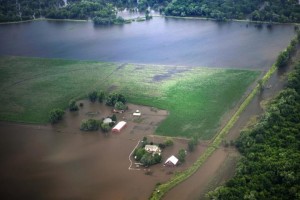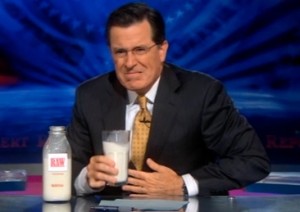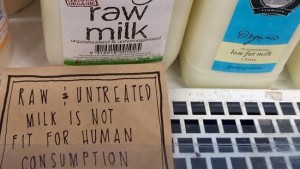Armchair epidemiologist, public health guru and West Virginia state lawmaker Scott Cadle, insists the raw milk he provided colleagues had nothing to do with an outbreak of illness, adding, “There’s nobody up there that got sick off that milk. It’s just bad timing, I guess.”
Tag Archives: West Virginia
Irony can be ironic: State lawmakers suffer stomach illness after drinking raw milk to celebrate legalizing raw milk, coincidence or causation?
In the weeks after passing a bill, allowing West Virginians to drink raw milk, one delegate brought the drink in to celebrate and, eventually, several lawmakers have gotten sick.
 Some lawmakers say it’s just a coincidence and a stomach bug is going around.
Some lawmakers say it’s just a coincidence and a stomach bug is going around.
Coincidence they all drank the raw milk?
The Charleston Gazette-Mail reports that during announcements in the House chamber Thursday, Delegate Scott Cadle, R-Mason, invited lawmakers — and anyone else who wanted to “live dangerously” — to sample raw milk that he had brought from a Mason County dairy. A handful of lawmakers who drank the raw milk later got sick, though there’s been no evidence that Cadle’s milk was the cause.
“There’s nobody up there that got sick off that milk,” said Cadle, who was home sick with a stomach bug Monday but returned to work at the state Capitol on Tuesday. “It’s just bad timing, I guess.”
The state Bureau of Public Health started an investigation Tuesday after receiving a complaint that the raw milk might have caused a disease outbreak.
Discussions of the raw milk, and ailing legislators and staff, dominated Capitol hallways this week.
After Gov. Earl Ray Tomblin signed the raw milk bill into law last week, Cadle walked up and down the Capitol’s East Wing, which houses delegates’ offices, offering up milk samples to anyone wanting a taste. Some people took just a sip, while others drank a glassful.
 “It ain’t because of the raw milk,” Cadle said. “With that many people around and that close quarters and in that air and environment, I just call it a big germ. All that Capitol is is a big germ.”
“It ain’t because of the raw milk,” Cadle said. “With that many people around and that close quarters and in that air and environment, I just call it a big germ. All that Capitol is is a big germ.”
Officials with the Bureau for Public Health and Kanawha-Charleston Health Department said Tuesday they hadn’t received any recent reports about illnesses caused by raw milk.
Several legislators who’ve been sick with stomach viruses did not sample the raw milk.
The raw milk bill doesn’t legalize the sale of raw milk. Instead, the legislation allows “herd-sharing” agreements, where people buy a share in a cow or other milk-producing animal and use that animal’s raw milk. Anyone who enters such an agreement must sign a statement acknowledging the risks of raw milk, specifically that it may contain bacteria like Listeria, salmonella and E. coli.
State law and DHHR rules forbid the sale or distribution of raw milk.
“Offering or selling raw milk to the public is prohibited,” according to the rules. Violators face a $50 to $500 fine, but DHHR officials said they were unaware of the law ever being enforced.
“I might have been breaking the law,” Cadle said. “Hell, I don’t know. I gave it away.”
Cadle, who is running for Mason County Commission instead of re-election to the House, would not say where he got the raw milk — only that it came from a neighbor’s dairy.
“I got a place to get it, and I’m not going to tell where I got it,” Cadle said. “It was free.”
Discard produce tainted by flood waters
West Virginia agricultural officials are advising growers to discard vegetables that have had contact with flood waters.
 The advice comes after weeks of rain that promoted Gov. Earl Ray Tomblin to declare states of emergency in 10 counties this week.
The advice comes after weeks of rain that promoted Gov. Earl Ray Tomblin to declare states of emergency in 10 counties this week.
West Virginia extension agent John Bombardiere says the safest way to deal with lettuce, tomatoes or potatoes that have been tainted by flood water is to toss them. He says they should not be consumed by humans or animals.
The advice is based U.S. Food and Drug Administration guidelines, which state there is no practical way to salvage the product.
Always the kids: Health concerns after raw milk bill moves forward in W. Virginia
Lydia Nuzum of the Sunday Gazette – Mail writes that for Amy Nordyke, it seemed like the right choice. After researching ways to improve her family’s diet, she stumbled across the idea of consuming raw milk.
 “It was very convincing — that raw milk, under certain circumstances, could be a perfectly safe food to consume for all ages,” Nordyke said. “We just jumped right in and started consuming it.”
“It was very convincing — that raw milk, under certain circumstances, could be a perfectly safe food to consume for all ages,” Nordyke said. “We just jumped right in and started consuming it.”
Nordyke, her husband and her children, who live near Fort Knox, Kentucky, had been consuming raw milk for nearly a decade when, in September 2014, Nordyke’s then 18-month-old son, Seamus, fell ill — first with bloody diarrhea, which quickly morphed into severe dehydration. Nordyke took him to a pediatrician and continued to monitor her son. When she realized Seamus was no longer urinating, she rushed him to her local hospital.
Seamus had developed hemolytic uremic syndrome, a condition caused by the premature destruction of red blood cells that clog the kidneys and cause them to stop functioning properly. The condition turned out be a complication from contracting E. coli, a bacteria commonly found in contaminated food. In Seamus’ case it came from consuming raw milk.
Seamus wasn’t the only one affected, Nordyke said, three other children had been admitted to the hospital for HUS, and Nordyke recognized the parents of one from Facebook. They were also members of the food club Nordyke procured her raw milk from.
“It was hard for me to accept at first that something that I had actively sought out for so many years could have made my child sick, but after a certain point, I just couldn’t deny it anymore,” she said.
According to the Centers for Disease Control and Prevention, 202 of the 239 hospitalizations involving tainted dairy products between 1993 and 2006 were linked to the consumption of raw milk or raw-milk cheese. More than 1,500 people were sickened by raw milk products in that time frame, according to the CDC. The CDC has also reported that unpasteurized milk is 150 times more likely to cause foodborne illness and results in 13 times more hospitalizations than illnesses involving pasteurized dairy products.
 There have been intermittent cases of raw milk contaminations over the years, but large-scale issues are rare, primarily because consuming raw milk is rare in the U.S., according to Dr. Art Rubin, interim health officer for the Kanawha-Charleston Health Department.
There have been intermittent cases of raw milk contaminations over the years, but large-scale issues are rare, primarily because consuming raw milk is rare in the U.S., according to Dr. Art Rubin, interim health officer for the Kanawha-Charleston Health Department.
“That’s been the problem in the Legislature,” Rubin said. “I think part of the reason these infections don’t look statistically significant is because there isn’t as much raw milk consumption, and I think if there were more, you’d start to see more side effects.”
Nordyke’s access to raw milk was the result of a loophole in Kentucky law. While the sale of raw milk in the state is illegal, there are no laws expressly prohibiting herd-sharing, she said.
“Herd-shares in Kentucky aren’t exactly legal, but they’re not illegal, either — it’s a loophole in the law,” she said. “Raw milk sales here are illegal, but you can milk your own cow, so if you own part of a cow, it becomes OK.”
Last week, the West Virginia House of Delegates voted 81-19 to allow the consumption of non-pasteurized milk in West Virginia. The Senate passed the legislation (SB30) last month, so the bill next goes to Gov. Earl Ray Tomblin for his signature. The bill will not allow the sale of raw milk, but will permit herd-sharing — buying stock in a cow or a herd and drinking milk produced by that cow or herd.
House Republicans noted in discussion of the bill that it was a matter of personal freedom
Despite having “one of the most severe” cases of HUS the hospital had seen, Seamus was able to make a full recovery after two weeks in the hospital, though he still receives check-ups to ensure that his kidneys are functioning as they should.
Restaurant inspection apps are coming for smart phones
Diners in Kanawha County, West Virginia will soon be able to check their mobile phones for restaurant inspections.
Dr. Rahul Gupta, executive director of the Kanawha-Charleston Health Department, told The Charleston Gazette he is developing a mobile application featuring inspections for all restaurants in the county.
He secured funding for the application three years ago, he said, when presenting the idea to the state Legislature. The idea can get off the ground with renewed interest in reforming the county’s .jpg) health inspections, he said.
health inspections, he said.
Gupta also presented the proposed changes to the county’s health inspections, modeled after Albany County, N.Y.
Beginning in July, Albany County will require restaurants to post a sign near the front of the entrance explaining the establishment’s sanitary inspection results. The sign will indicate Excellent Compliance, Good Compliance or Fair Compliance with the county’s health code. Restaurants that received unsatisfactory ratings will be shut down and re-inspected within days.
Girl almost dies from E. coli after helping dad slaughter deer
Demonstrating once again that dangerous E. coli like O157:H7 exist in all ruminants, 7-year-old April Lambert of Beckley, West Virginia underwent a horrific yet typical encounter with E. coli as her kidneys shut down and doctors scrambled to save her life.
The Charleston Daily Mail reports that April’s father, Red, had shot a deer the Friday after Thanksgiving and she helped him skin it and prepare bigger cuts to send off to a local butcher, but Red cut the tenderloin himself.
 April placed the pieces of meat into freezer bags, handling the meat with her hands.
April placed the pieces of meat into freezer bags, handling the meat with her hands.
The family and the doctors concluded that April likely hadn’t washed her hands afterward as well as she could have. In fact, April recalls she may have rinsed them and not used soap.
Dr. Amana Nasir, a West Virginia University pediatric gastroenterologist who was on the team that treated April in Charleston said she and fellow doctors have treated four similar cases traced to handling of deer meat, adding,
"Deer harbor infection – it’s estimated that 17 percent of the whitetail population harbors E.coli.”
The natural reservoirs for E. coli O157:H7 and other verotoxigenic E. coli is the intestines of all ruminants, including cattle — grass or grain-fed — sheep, goats, deer and elk.
